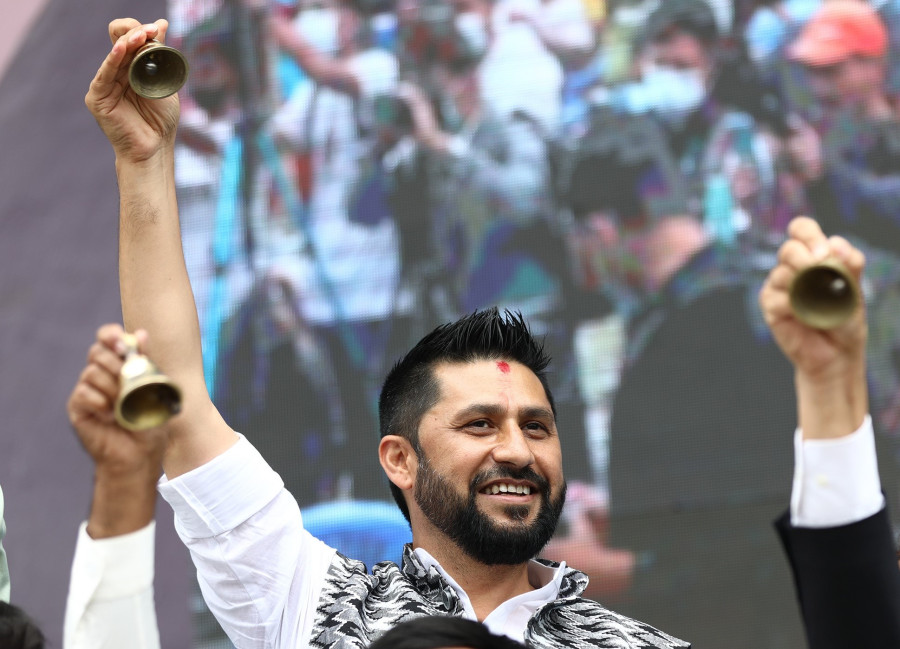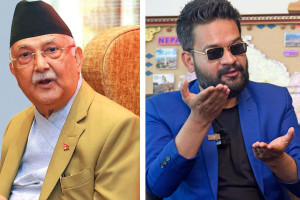Columns
New kid in town
We do not know if RSP is independent of political dogma or a party of the independent-minded.
Deepak Thapa
With the excitement of Dashain and Tihar as well as the general elections finally over, it is high time normal life was allowed to resume. It is a wonder how our government ceases to function during the holiday season every year, with almost anything of consequence put off till “after Dashain”, then “after Tihar”, and in a worst-case scenario, “after Dashain-Tihar”. This year, we were slapped with the third whammy of “after the elections”.
Everything is done and over with by now, but the air of anticipation is still high. That is because how the election results turned out. To begin with, there is the question of who will become prime minister. While Sher Bahadur Deuba is likely to face a challenge from within his own ranks, the imperative of coalition politics in a hung Parliament only serves to deepen the uncertainty. Regardless of what our politicos have been going around spouting, we all know that until a government is firmly in place, sworn in and flagged off, there is no knowing who is going to pip whom to the post through all kinds of shenanigans they have mastered the art of. Then there is the rise of new political forces and what they could possibly portend. More on that later.
Cry, fraud!
First, the results, and the cry-babies. These are those who were beaten—soundly or otherwise—but cannot accept the fact that perhaps more people preferred their rivals over themselves. Leading this brigade is the Unified Socialists strongman and former prime minister Jhala Nath Khanal. Paraphrasing an analyst, people like Khanal never lose; either they win or there is electoral fraud. Also pushing the theory of fraudulence was KP Sharma Oli, but going in the opposite direction, declaring that his bête noire, the Unified Socialists, were being helped across the 3 percent threshold line in the proportional representation part of the election, an outcome that is yet uncertain. Does it never occur to these worthies that by crying foul, they are undermining the entire electoral process, the same that has granted them legitimacy over the decades?
Charges of rigging in an election that sees the incumbent home minister lose despite having the entire state machinery at his disposal is somewhat difficult to digest. Since the first post-1990 election all the way to the current one, we have heard of electoral malpractices. Like, I presume, everyone else, I also believe those certainly exist although I have not seen any first-hand evidence myself from the safety of my staid Kathmandu constituency. Examining the record over the years, starting with the defeat of then prime minister Krishna Prasad Bhattarai in 1991, we see heavyweights in power humbled time and again. One cannot but conclude that for all the problems, our elections do reflect the true will of the people.
There is, of course, the issue of votes being sold, and worse, being bought by those who profess fealty to free and fair elections. We hear about those in abject poverty committing to vote a certain way in exchange for a few hundred rupees or a hearty meal since it matters nought to them who wins since everyone is going to lord over them in the long run. Losers will certainly attribute their loss to such practices; but as far I am aware, no one has quantified their effect to prove these were game-changers. One or two candidates may be able to barrel their way through, but surely their victory would have been offset by others employing similar methods. Which major party in all seriousness can claim to be holier than the other?
There are grey areas as well. A party worker who had just returned from the campaign in a mountain district recounted what he had witnessed. Two voters from a neighbouring district happened to be plying their trade in his district. In those sparsely populated regions where each vote counts, rather than take the chance, one of the candidates from the neighbouring district arranged to spirit the duo down one river valley to the highway in the midhills and up another river valley for the vote, and back again, a two-day journey each way. The cost was Rs100,000 per vote to make up for business lost during the days they were away, and Rs80,000 for the jeep that carted them back and forth. Would that qualify as vote-buying? I am not so sure.
Independent or independents
Much has been written about the absence of any ideological underpinning among the political parties and alliances in this election season. The Janata Samajbadi Party paired up with an implacable foe, Oli, while the Loktantrik Samajbadi decided to ditch the same Oli despite the latter having courted them for his own political survival. Both received a lashing from the electorate, and perhaps deservedly so.
The Janamat Party and the Nagarik Unmukti Party are both new entities, and we can assume where they stand—for Madheshi and Tharu rights, respectively. The question is will they be able to deliver given their limited presence in Parliament? Some authority will devolve to them if they join the establishment, but that is a slippery slope they would do best to avoid if they plan to be in the political game for the long haul. Since they will not be able to achieve anything substantial, it is better not to be tainted by association and continue working for the people at the grassroots, and build the party organisation.
The big surprise of the election, the Rastriya Swatantra Party (RSP) or the National Independent Party, is an unknown quantity. Led by a media personality, Rabi Lamichhane, who ran a TV programme that can best be described as a populist show that ran exposés, among others, we do not yet know if this party is independent of political dogma or if it is a party of the independent-minded. Knowing what little is known of those already elected and those likely to be brought in through the proportional representation system, one would hope it is the latter. With the numbers the RSP will eventually have, it surely has a chance of making a go at institutional reform, but that can only come with the recognition that there are no quick fixes.
What is scarier is the possibility of the party resorting to the kind of populism Lamichhane made his name with. As journalist Basanta Basnet has written in his astute piece on the RSP, since Lamichhane has declared his party to be “middle-right”, will it follow the right-wing policies of similarly named “independent” parties of the West?
I end with a free translation of Basnet’s summation of what we know of the RSP so far by way of tempering any unrealistic expectations we may have garnered: “The RSP is indifferent to the agenda of change established by the [second] People’s Movement and of the Madhesh Movement... Despite extolling the country’s glorious national history, it is equally indifferent to the diversity represented by its citizens… The party argues that the country should be ruled through meritocracy…representing a characteristic common to rightists… It is silent on issues of positive discrimination, meeting the basic needs of the marginalised, or social justice that is essential for minimum economic and social harmony. The party shows no clarity on these and other basic preconditions of a true democracy.”




 10.12°C Kathmandu
10.12°C Kathmandu















